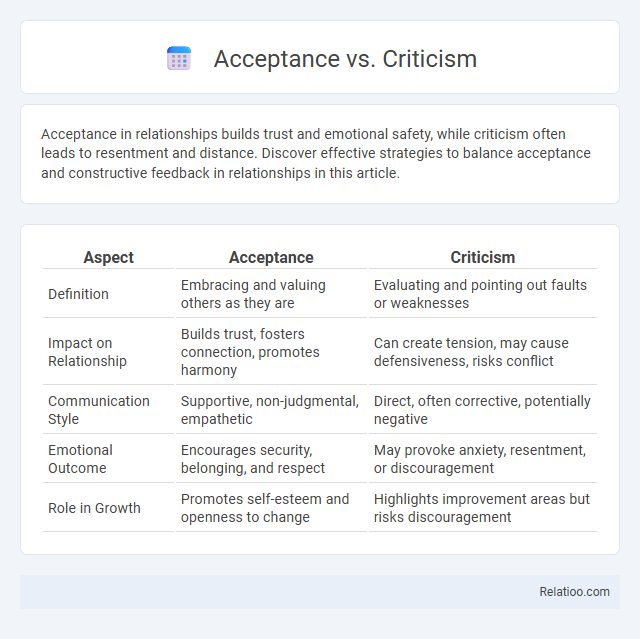Acceptance in relationships builds trust and emotional safety, while criticism often leads to resentment and distance. Discover effective strategies to balance acceptance and constructive feedback in relationships in this article.
Table of Comparison
| Aspect | Acceptance | Criticism |
|---|---|---|
| Definition | Embracing and valuing others as they are | Evaluating and pointing out faults or weaknesses |
| Impact on Relationship | Builds trust, fosters connection, promotes harmony | Can create tension, may cause defensiveness, risks conflict |
| Communication Style | Supportive, non-judgmental, empathetic | Direct, often corrective, potentially negative |
| Emotional Outcome | Encourages security, belonging, and respect | May provoke anxiety, resentment, or discouragement |
| Role in Growth | Promotes self-esteem and openness to change | Highlights improvement areas but risks discouragement |
Understanding Acceptance and Criticism
Acceptance involves recognizing reality without resistance or denial, fostering emotional resilience and self-compassion. Criticism evaluates behaviors or ideas, often highlighting flaws to encourage improvement but can sometimes lead to defensiveness or diminished self-esteem. Understanding the distinction between acceptance and criticism is crucial for balanced self-assessment, promoting growth while maintaining psychological well-being.
The Psychology Behind Acceptance
The psychology behind acceptance emphasizes embracing life experiences without resistance, promoting emotional resilience and mental well-being. Acceptance reduces psychological distress by decreasing defensive reactions and fostering mindfulness, which enhances self-awareness and emotional regulation. This approach contrasts with criticism and nonjudgmental attitudes by actively acknowledging reality rather than merely refraining from judgment or highlighting flaws.
The Role of Criticism in Personal Growth
Criticism serves as a crucial catalyst for personal growth by highlighting areas for improvement and fostering self-awareness. Constructive feedback encourages reflection and adaptation, enabling individuals to refine their skills and mindset. Embracing criticism with a nonjudgmental attitude facilitates resilience and continuous development, distinguishing it from mere acceptance or rejection.
Emotional Impact: Acceptance vs Criticism
Acceptance fosters emotional resilience by validating Your feelings and promoting self-compassion, which reduces stress and anxiety. Criticism often triggers defensiveness, undermines self-esteem, and intensifies negative emotions such as shame or guilt. Cultivating acceptance over criticism leads to healthier emotional regulation and improved psychological well-being.
Constructive Criticism: Turning Negativity into Growth
Constructive criticism transforms negativity into growth by focusing on specific behaviors and actionable suggestions rather than personal faults, helping You improve skills and performance. A nonjudgmental attitude creates a safe space for receiving feedback without emotional bias, encouraging open-minded acceptance and reflection. Balancing acceptance with critical insight fosters development while maintaining self-esteem and motivation.
The Dangers of Over-Acceptance
Over-acceptance can lead to complacency, where individuals tolerate harmful behaviors or toxic environments without seeking improvement or change. This excessive acceptance may undermine personal boundaries and hinder growth by avoiding necessary constructive criticism. Maintaining a balance between acceptance and critical awareness promotes emotional resilience and healthier decision-making.
Balancing Acceptance and Criticism in Relationships
Balancing acceptance and criticism in relationships requires recognizing the value of acknowledging your partner's strengths while addressing areas needing growth with constructive feedback. Maintaining a nonjudgmental attitude fosters open communication and emotional safety, allowing both individuals to express feelings without fear of harsh judgment. Your ability to blend acceptance with thoughtful criticism cultivates deeper trust and healthier connection.
Acceptance vs Criticism in the Workplace
Acceptance in the workplace fosters a culture of inclusivity and psychological safety, enabling employees to express ideas without fear of harsh judgment or backlash. Criticism, when poorly delivered, can stifle creativity and reduce motivation, but constructive feedback supports growth and performance improvement. Emphasizing acceptance over criticism cultivates trust, enhances collaboration, and drives sustained organizational success.
Strategies to Cultivate Healthy Acceptance
Cultivating healthy acceptance involves practicing mindfulness to observe thoughts and emotions without immediate reaction, fostering self-compassion to treat oneself with kindness during challenges, and reframing negative self-talk into balanced perspectives. Setting realistic expectations and recognizing that imperfections are part of the human experience support embracing situations as they are rather than resisting or overly criticizing them. Developing these strategies reduces internal conflict, promotes psychological well-being, and enhances emotional resilience over time.
Building Resilience Through Balanced Criticism
Balancing acceptance, criticism, and a nonjudgmental attitude is essential for building resilience in personal growth and relationships. Acceptance fosters self-compassion and reduces stress, while constructive criticism provides valuable feedback for improvement without damaging self-esteem. You can develop stronger resilience by embracing criticism as a tool for growth and practicing a nonjudgmental attitude to maintain emotional balance and openness.

Infographic: Acceptance vs Criticism
 relatioo.com
relatioo.com